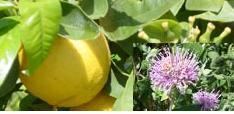
It is important to realize that the bergamot fruit and flower shown above are unrelated to each other. The flower and leaves can be used for potpourri and they have some medicinal qualities, but aromatherapy focuses on the oil extracted from the fruit.
Oil from the bergamot orange, a Mediterranean citrus fruit, can be used to flavour tea (Earl Grey comes to mind). The aromatic oil comes from the peel of the orange and it can help you relax in the comfort of your home.
Find out how aromatherapy works here.
Here are some facts about this essential oil:
|
Botanical Name
|
Citrus bergamia |
|
Family
|
Rutaceae |
|
Extraction Method
|
Cold Expression (Cold Pressed) or Steam Distilled |
|
Essential Oil Colour
|
Gold with a Green Tinge |
|
Consistency
|
Thin |
|
Description
|
Top note, and medium initial strength, it has a sweet and spicy, fresh citrus aroma with a hint of floral scent. |
|
Important Constituents
|
Limonene, Linalyl Acetate, Linalool, Bergaptene |
How Can You Use This Herb?
-
- Cooking. If you’re lucky enough to have access to fresh fruit, then you can make your very own marmalade or preserve or perhaps even make your own candy.
- Tea. Need I mention the famous Earl Grey tea? And the great news is that you can find it in your local grocery store. Be aware that Earl Grey comes in both caffeinated and decaffeinated versions.
- Essential Oil.
This essential oil is very versatile in aromatherapy. For example, it can help with physical skin problems such as acne, abscesses, eczema, insect bites, scars, oily skin, psoriasis, scars, and wounds. This oil also has a strong affinity for the urinary system. For women, it also helps with problems associated with the vaginal region such as cystitis, vaginal discharges, gonorrhea, herpes, etc. For men and women, it is a tonic for the digestive system. It can alleviate gas, indigestion, and loss of appetite. Having a combination of sedative and uplifting qualities, this essential oil is ideal for all states of anxiety and depression. It can refresh and lift your spirit and assist mental performance by reducing agitation, anxiety, and insomnia. Bergamot can also be mixed with marjoram, jasmine, rose, chamomile, geranium, lavender, or sandalwood to create new refreshing blends.
Because of the elevated phototoxicity of this essential oil, DO NOT apply this oil directly to the skin without being diluted in a carrier oil first. An estimate of 5-30 drops of essential oil per 1 oz of carrier oil is suggested. Make sure to read the important safety note below.
Where Can You Find This Essential Oil?
Here is one online aromatherapy supplier that I recommend:
You can also find this oil from your local aromatherapy retail store. The retailer associated with the previous link sells bergamot essential oil in 0.33 oz bottles.
If you opt for another retailer, this essential oil also comes in 1/8, 1/4, 1/2 or 1 oz bottles and can be found in major drugstores and specialized stores. Many internet-based aromatherapy companies carry this essential oil in larger sizes as well.
